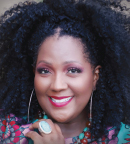When I was diagnosed with breast cancer 17 years ago, Black women were 41% more likely to die of the disease than White women. That statistic hasn’t changed.
By Rev. Tammie Denyse, MDic, MCL, as told to Jo Cavallo
ASCO Post
May 10, 2022
What is so dismaying to me is that the statistic on survival for Black women with breast cancer has not changed since I was diagnosed with breast cancer 17 years ago. In 2005, Black women were 41% more likely to die of the disease than White women, even though Black women are less likely to be diagnosed with the cancer, and nearly 2 decades later that percentage hasn’t changed,1 despite advances in treatment. Based on my personal journey as a patient, and through my patient advocacy, I’m determined to alter those odds for Black women.
Advancing Cancer Care for Black Women

I was just 39 when I was diagnosed with stage 2B hormone receptor–positive invasive ductal cell carcinoma. A baseline mammogram had picked up two small suspicious masses in my left breast, and a tissue biopsy confirmed I had cancer. My oncologist recommended a lumpectomy, followed by adjuvant chemotherapy and radiation therapy. He offered me an opportunity to participate in a clinical trial that was investigating the efficacy of the combination chemotherapy regimen ACT (doxorubicin, cyclophosphamide, and paclitaxel) every 14 days vs every 21 days in premenopausal women
It gives me the chills even now to think I was part of a study that has resulted in changing the standard of care for women with breast cancer and minimizing the impact of side effects on their lives. However, at the time I questioned how I would benefit from the clinical trial.
I’m not blind to the history in this country of medical experimentation on Black people, and, at first, I was hesitant to participate in the study. When I asked my oncologist how well Black women were responding to the treatment in the trial, shockingly, he said he didn’t know. Later, I learned it was because there were so few Black women enrolled in the study. That was unacceptable to me.
At the time, I was a single mother with three children and needed my best shot at making it to at least the 5-year mark, despite the statistics indicating I was unlikely to reach that coveted milestone. But I confess, I was no different in my uneasiness regarding clinical trials from many other Black people, who have vivid memories of the tragic Tuskegee syphilis study that lasted for 40 years.2 However, I was motivated to join the study because I wanted to increase the representation of Black women and to be part of answering the question of how we responded to the treatment. That’s when I made the decision to participate in the clinical trial.
In addition to chemotherapy, I had 38 radiotherapy treatments and was prescribed tamoxifen for 5 years and then 10 years, after studies showed it was more effective. But after 6.5 years of switching from tamoxifen to anastrozole to letrozole, the side effects of these drugs became unmanageable, and I decided quality of life was more important than quantity of life; after consulting with my oncologist, I stopped taking the medication.
However, my experience with cancer doesn’t end here. After experiencing severe menstrual bleeding following radiation therapy and consulting with my doctor, I decided to have a complete hysterectomy. Two years later, I had a bilateral mastectomy after a precancerous tumor was found on my right breast.
Since then, I’m happy to say, I’ve been cancer-free. But the experience of having cancer was traumatizing. In addition to coping with the disease and treatment side effects, everything I knew about breast cancer in Black women led me to believe I was going to die within 5 years.
A Human Being, Not Just a Diagnosis
When I was first diagnosed, I remember my surgeon saying to me, “You are 39 years old and have a very aggressive cancer, but you are young and healthy. If you work with us, I will do everything in my power to help save your life.” Those words gave me hope. They told me that I had people on my medical team to partner with me in the fight to save my life, and that helped to take the sting out of this challenging process. They also saw me as a human being—not as a Black or White woman, not as a diagnosis, and not as a statistic—who wanted to live.
I also remember my surgeon telling me that despite having an aggressive cancer, if I gave modern medicine at least a year to do its job, it could give me the next 40 to 50 years of life. I’m looking forward to those years.
My experience with cancer empowered me to be assertive and to become an equal partner in the decision-making of my care, and I wanted other Black women experiencing a cancer diagnosis to have that same sense of empowerment. About 2 years after my cancer diagnosis, my late sister and I launched Carrie’s TOUCH (carriestouch.org), a nonprofit breast cancer organization, to give voice to women who look like me and to significantly increase the number of Black breast cancer survivors.
I am also an ordained clergywoman and take my message of hope, the value of self-care, the importance of early detection, and the necessity of mammogram screenings to churches and to my community. But more needs to be done to change the reality that Black women continue to have a higher rate of mortality from breast cancer than White women.
What I want oncologists and researchers to know is that if cancer outcomes improve for Black women, by default, they will improve for all women.
Rev. Denyse lives in Sacramento. She is Co-Founder and President of Carrie’s TOUCH; co–principal investigator of Project SOAR: Speaking Our African American Realities; and the author of Power of Hope: Reclaiming Your Life After Tragedy (BestSellersGuild.com, 2018).
Editor’s Note: Columns in the Patient’s Corner are based solely on information The ASCO Post received from patients and should be considered anecdotal.
REFERENCES
1. American Cancer Society: Cancer Facts & Figures for African American/Black People 2022-2024. Available at www.cancer.org/content/dam/cancer-org/research/cancer-facts-and-statistics/cancer-facts-and-figures-for-african-americans/2022-2024-cff-aa.pdf. Accessed April 22, 2022.
2. Centers for Disease Control and Prevention: The Tuskegee Timeline. Available at www.cdc.gov/tuskegee/timeline.htm. Accessed April 22, 2022.
